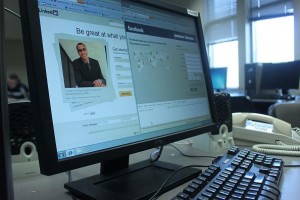While getting ready for a night out, has someone you know ever asked, “Do I look fat in this?” You may or may not answer honestly, but if they have a Facebook, they may already know the answer.
The newest study about the effects of Facebook comes from the Center for Eating Disorders at Sheppard Pratt in Maryland. The study surveyed 600 Facebook users between the ages of 16 and 40. More than half said that Facebook makes them more self-conscious about their bodies and weight.

St. Thomas sophomore Maya Peters said spending too much time on Facebook puts her in a negative mood and also makes her more aware of her image when getting ready.
“If I end up wearing something really cute, then I want to take pictures because then everyone else can see how cute I look,” Peters said. “I don’t really dress up for Facebook, but if I’m wearing a really cute outfit I might make more of an effort to get in front of a friend’s camera.”
Peters said spring break plays into how social media can affect a person’s body image when friends post pictures from exotic locations in swimsuits.
“If you’re insecure about your body image and you’re seeing people you don’t like so much who are having fun on a beach, you get jealous,” she said.
Facebook’s new timeline feature also makes it much easier to pull up older pictures of yourself, which Peters said could be a good thing.
“You can see sometimes you gained a couple pounds in college and for me it’s almost a little motivating,” she said. “It’s like ‘OK, I have gained five pounds in college. Time to drop that.’”
However, for junior Joe Meyer, Facebook is more about staying connected with friends from his hometown of Chicago and less about seeing how other people look.
“I don’t use [Facebook] to see how I’m doing compared to other people or look at my body image,” he said. “Anytime I go out I’m trying to look my best, but I’m not worried about pictures being taken.”
Health and Human Performance adjunct professor Christina Meyer-Jax is a registered dietitian who consults for companies and nonprofits on nutrition communications and media projects. She said that Facebook has turned people into “little micro-celebrities in our own little universe.”
“I feel like the average person is getting similar pressure on appearance that was once only for celebrities,” she said.
Sophomore Alex Rollings said that many images on Facebook can be misleading, and it’s turning into a vanity site for both genders.
“I think girls get the wrath for posting their best pictures that they have touched up a lot,” he said. “But, I’ve seen one too many guys photos that have been way edited, and it makes me sad to see that.”
Meyer-Jax said Facebook and other social media sites can be used to support yourself in an eating disorder because other people can encourage you into positive health habits and ways to lose weight. She encourages students to start “liking” things that promote healthy eating and exercise habits, which will create a positive support group on Facebook and not drag you down in self-image issues.
“Being a healthy weight isn’t just about losing weight, it’s about eating healthy,” she said.
Kristopher Jobe can be reached at jobe1276@stthomas.edu.


I am glad studies are finally addressing this issue. Also, I really appreciated that the article did not exclusively focus on the impact towards body image for women. Men suffer from this problem as well and though I love Facebook, I have seen so many terrible things that frankly affect me.
It was for this reason that I initially stated No Facebook November several years ago. I think it is time we start acknowledging this because it is really destroying the self-confidence of many young people these days.